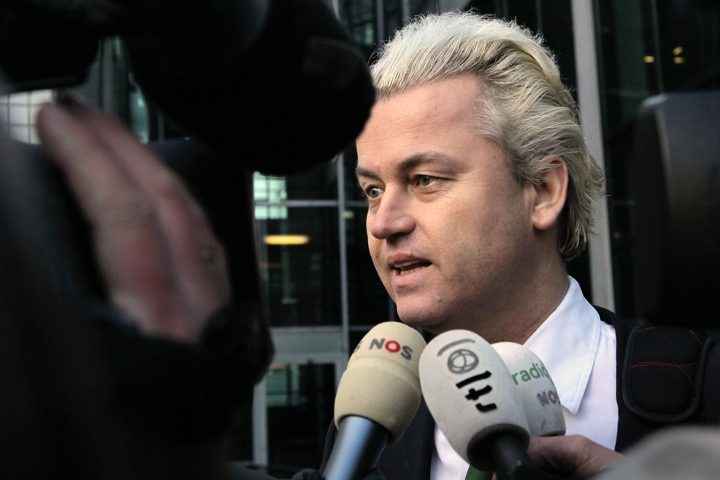
People “in Africa and the Middle East will start thinking they might be better off elsewhere.” So said the Netherlands’ Geert Wilders, whose Party for Freedom (PVV) leads a coalition that will soon helm Holland’s government. The coalition has vowed to opt out of European Union rules and adopt the “strictest-ever” asylum policy.
“The sun will shine again in the Netherlands… The Netherlands will be ours again,” Wilders also stated, after enduring a five-month struggle to form a government comprising the PVV and three other parties. It’s still a baby step, perhaps, but it does strike a blow against that uniquely Western affliction, immigrationism.
Wilders well knows immigrationism’s consequences, too, having long lived under 24/7 police protection in his own country due to Islamist death threats.
The Associated Press reported on the immigration-reform story late last week:
Wilders and three other party leaders agreed on a coalition deal early Thursday that veers the Netherlands toward the hard right, capping a half year of tumultuous negotiations….
The “Hope, courage and pride” agreement introduces strict measures on asylum seekers, scraps family reunification for refugees and seeks to reduce the number of international students studying in the country.
“Deport people without a valid residence permit as much as possible, even forcibly,” the 26-page document says.
“We are writing history today,” Wilders proclaimed, saying he had made sure the three other coalition parties, including the one of outgoing Prime Minister Mark Rutte, had accepted the core of his program.
“The sun will shine again in the Netherlands,” Wilders said. “It is the strongest asylum policy ever.”
To facilitate the policy, the incoming coalition stated that an “opt out clause for European asylum and migration policies will be submitted as soon as possible to the European Commission.” Given the EU’s globalist, immigrationist nature, pushback against this may appear insurmountable. Except there’s this:
“With hard-right and populist parties now part of or leading a half dozen governments in the 27-nation European Union, they appear positioned to make gains in the bloc’s June 6-9 election,” the AP also informs.
Of course, calling these parties “hard-right” is bias (strangely, a party can never be left-wing enough to be labeled “hard-left”). The entities and politicians in question are still statists and largely secular in nature; they’re just not the full-bore globalist, immigrationist socialists the mainstream media consider “centrist.”
Because of this, establishment pseudo-elites were shocked when Wilders’ party became the Netherlands’ largest during the country’s election last November. The PVV still hadn’t won enough seats to govern alone, however, so it had to enter into difficult negotiations with other parties, a fractious process that threatened to allow the hard-left to retain power.
The resulting compromise was interesting, and not just because it required Wilders to relinquish the possibility of becoming prime minister. In fact, to “make the agreement fair to all four parties, none of them will send their own politicians into government,” Breitbart relates. “It appears the ministry positions and Prime Ministership will be held by ‘technocrats’ — non-politicians and typically academics and economists — who would implement the government programme as dictated by the four [party heads].”
Of course, this program isn’t limited to combating the demographic attack on the West. For example, “Apart from curbing migration, the coalition said it aims to build nuclear power reactors and expand offshore natural gas production,” reports DW.com.
“The new government will ‘adhere to the existing agreements’ on climate, but warned ‘if we don’t achieve the goals, we will make alternative policies,’ the deal said,” the site continues. “It also promised to ease the burden of environmental rules for farmers.” This is significant because the Netherlands — the world’s second largest agricultural exporter — has been roiled by farmers protests inspired by onerous greentopian regulations.
It is the (im)migration reform that’s most significant, however, because it will largely determine whether or not the West survives as a culture. Consider:
- In Amsterdam, the Netherlands’ capital, a majority of the population is now of foreign ancestry.
- British actor/comedian John Cleese noted years ago already that “London is no longer an English city.” Why? The capital, 87 percent “White British” in 1971, is now just 36.8 percent white British.
- In 2017, French intellectual Christian de Moliner suggested that France be divided to avoid “civil war” with its Muslims.
- In 2001, multiculturalist politician Mona Sahlin said, commenting on demographic change, that “the Swedes must be integrated into the new Sweden; the old Sweden is never coming back.”
Sahlin’s comment reflects a mind imbued with immigrationism, the belief that immigration is always good, always necessary, must never be questioned, and must be the one constant in an ever-changing universe of policy. It also, again, is uniquely Western. Consider:
- When Japan expelled illegal aliens years ago, it unabashedly stated that “Japan is for Japanese.”
- When there’s trouble (i.e., almost always) in Syria, Afghanistan, or some other Arab country, wealthy Arab nations such as Dubai, the UAE, and Saudi Arabia refuse to take “refugees” from them. Instead, they’re shipped into the heart of the West.
- Under Mexico’s constitution, a naturalized citizen may never enjoy full citizenship rights.
- China, Russia, and, in fact, most nations on Earth still adhere to the historical norm of trying to keep unassimilable foreign elements out of their lands, as opposed to inviting them in.
Note here that migration was a major factor in the Roman Empire’s demise, as demography was destiny. It still is, too. If a primitive tribe were being overrun by outsiders, “enlightened” statists would warn, “This is cultural and demographic genocide!”
When it happens in the West, though, it’s blessed “diversity” — in which our strength lies (the lies hold).
This said, the issue isn’t immigration as much as immigrationism. Before we can change our reality, after all, we must change our thinking. And regarding the matter here, “turning Japanese” wouldn’t be a bad idea.



